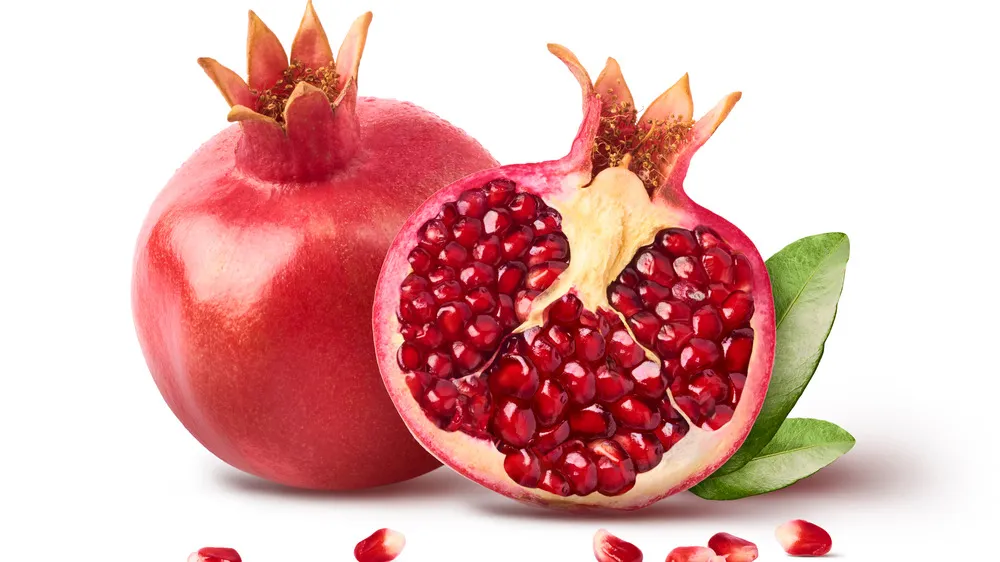Pomegranate seeds, the jewel-like gems inside pomegranates, are a burst of sweet and tart flavor with impressive health benefits. These seeds are rich in antioxidants and polyphenols, and studies suggest they can help reduce inflammation, slow cancer cell growth, combat infections, and enhance brain function. Plus, they’re versatile and delicious, making them an excellent addition to your diet.
What Are Pomegranate Seeds?
Pomegranate seeds come from the pomegranate fruit (Punica granatum), a large fruit with a thick, leathery skin that can range from brownish-yellow to deep red. Known for their vibrant, ruby-red arils—the seed pods surrounded by juicy, edible fruit—pomegranates can contain over 600 seeds. These seeds are often consumed raw, juiced, or processed into pomegranate seed oil, which offers various health benefits.
The pomegranate is native to Iran and its surrounding regions but is now widely cultivated across the Mediterranean and parts of the Americas. The seeds are not only nutritious but also used in making grenadine syrup, a key ingredient in classic beverages and various culinary applications.
Nutritional Benefits
Pomegranate seeds are a nutritional powerhouse, providing:
- 72.2 calories
- 16.3 grams carbohydrates
- 1.5 grams protein
- 1 gram fat
- 3.5 grams fiber
- 14.3 micrograms vitamin K (18% DV)
- 8.9 milligrams vitamin C (15% DV)
- 33.1 micrograms folate (8% DV)
- 205 milligrams potassium (6% DV)
They are low in calories and high in fiber, vitamin K, vitamin C, and potassium, making them an excellent choice for a heart-healthy diet.
Health Benefits
- Boost Libido: Pomegranate seeds have been linked to increased testosterone levels and improved sexual function. A study found that consuming pomegranate juice raised salivary testosterone levels by 24%, potentially enhancing mood and libido.
- Ease Arthritis: The flavonols in pomegranate seeds have anti-inflammatory properties that may help reduce arthritis symptoms. Animal studies suggest that pomegranate extract can lessen joint inflammation and the severity of arthritis.
- Fight Cancer: Pomegranate seeds are known for their potential cancer-fighting properties. They contain punicic acid, which may inhibit breast cancer cell proliferation and slow prostate cancer growth.
- Lower Blood Pressure: Regular consumption of pomegranate juice has been shown to reduce systolic and diastolic blood pressure. Studies indicate that it can lower blood pressure by up to 7% and 6%, respectively.
- Combat Bacterial Infections: Pomegranate extracts have been traditionally used to treat various infections and may help stimulate beneficial gut bacteria, enhancing your ability to fight bacterial infections.
- Improve Heart Health: Pomegranate juice is rich in antioxidants that help prevent cholesterol buildup in the arteries. Research has shown it can reduce arterial plaque by 30% and lower blood pressure in those with carotid artery stenosis.
How to Open Pomegranate Seeds
Opening a pomegranate requires a bit of technique:
- Roll the Fruit: Roll the pomegranate on a hard surface to loosen the seeds.
- Score and Open: Score the fruit around its middle with a knife and tear it into two halves. Be careful not to cut through the seeds.
- Extract Seeds: Hold each half over a bowl with the seeds facing down and tap the skin with a wooden spoon to release the seeds.
- Remove Pith: Remove any remaining white pith with your fingers or a spoon.
Pomegranates can be stored at room temperature for up to a week or refrigerated for up to two months. Fresh seeds last about three days in the fridge but can be frozen for up to six months.
Recipes and Uses
Pomegranate seeds are perfect on their own or incorporated into various dishes. Try adding them to smoothies, salads, salsas, or desserts. They pair beautifully with ingredients like beets and goat cheese, and can be used in recipes such as Chia Spiced Pudding with Pomegranate Seeds. Dried pomegranate seeds, known as anardana, can also be ground into a powder for added flavor in dishes.
Side Effects and Precautions
Pomegranate seeds are generally safe for most people, but if you have allergies or are on blood pressure medication, consult your doctor before consuming them. Pomegranate juice may interact with certain medications, so it’s best to discuss with your healthcare provider if you’re taking blood thinners or blood pressure medication.
Final Thoughts
Pomegranate seeds are a nutrient-rich superfood with numerous health benefits, from boosting libido and improving memory to fighting cancer and lowering blood pressure. Whether you enjoy them fresh, as juice, or in various recipes, they are a valuable addition to a healthy diet.
Disclaimer: The above-mentioned information is for reference purposes only

